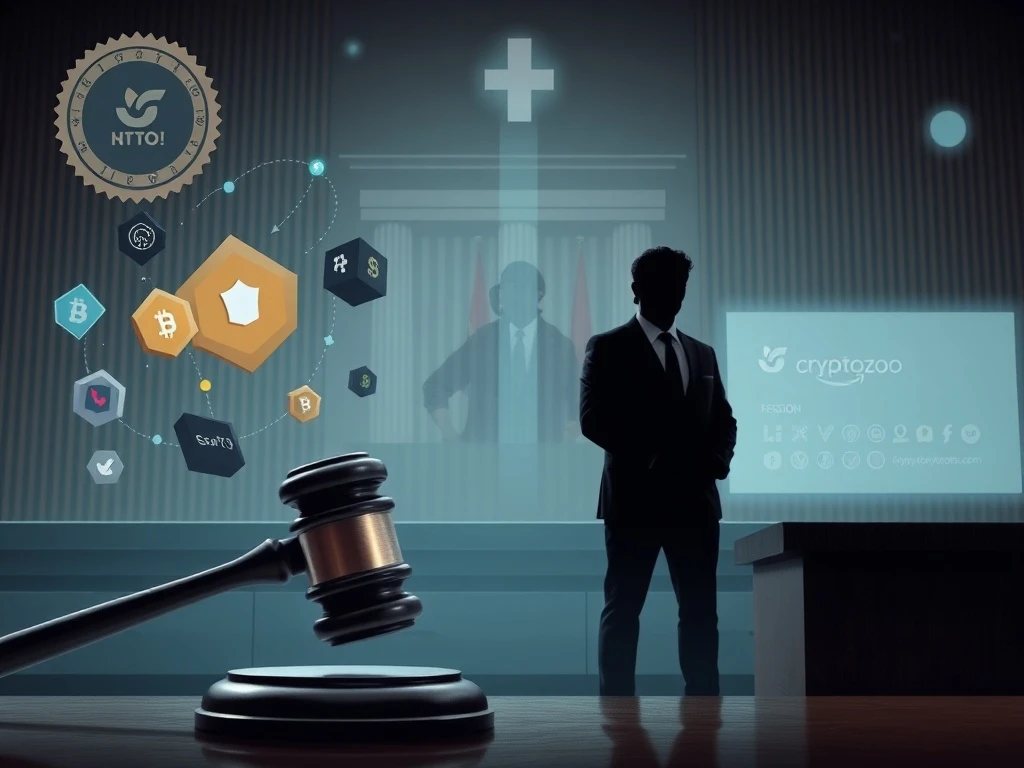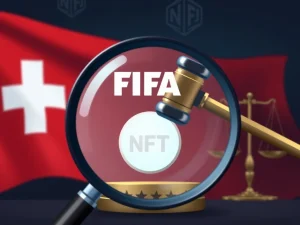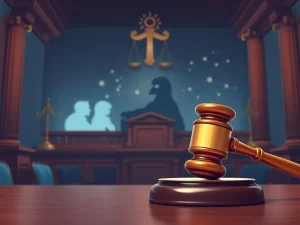Logan Paul CryptoZoo: Judge Delivers Crucial Ruling on Co-Founder Liability

The world of cryptocurrency and NFTs is no stranger to controversy, and few sagas have captured public attention quite like the one surrounding YouTube star Logan Paul and his ill-fated CryptoZoo project. In a significant development, a U.S. federal magistrate has delivered a crucial ruling, blocking Paul from holding his Logan Paul CryptoZoo co-founders solely liable. This decision highlights the intricate web of legal challenges in the digital asset space and raises critical questions about accountability in failed crypto ventures.
Logan Paul CryptoZoo: Unpacking the Controversial Project
The CryptoZoo saga began in 2021, promising a groundbreaking blockchain-based game where users could hatch NFT “eggs” into unique digital animals. These animals were meant to be tradable and integral to the game’s ecosystem. However, the game never materialized, leaving investors with unfulfilled promises and digital assets that ultimately lost significant value. This led to widespread accusations of a “rug pull,” a term used to describe a deceptive exit strategy where developers abandon a project after raising substantial funds.
Logan Paul, as the public face of CryptoZoo, found himself at the center of a class-action lawsuit filed by aggrieved NFT buyers in early 2023. The lawsuit named Paul, along with co-founders Eduardo Ibanez and Jake Greenbaum, alleging fraudulent practices. Paul, in turn, filed a counterclaim in January 2024, asserting that Ibanez and Greenbaum defrauded him, leading to the project’s collapse. This move sought to shift the primary blame onto his partners, but a recent court decision has complicated that strategy.
NFT Lawsuit Implications: Why the Judge Stepped In
Judge Ronald Griffin of the Texas Western District Court recently denied Logan Paul’s motion for a default judgment against Ibanez and Greenbaum. The core reason? Concerns about legal consistency. The judge emphasized that allowing Paul to secure a judgment blaming only his co-founders would undermine the broader class-action NFT lawsuit brought by the NFT buyers.
- The Problem of “Sole Liability”: The plaintiffs in the original lawsuit allege joint fraud against Paul and his co-founders. If the court were to grant Paul’s motion and declare Ibanez and Greenbaum solely responsible, it would create conflicting legal outcomes for the same set of facts.
- “Similarly Situated” Defendants: Judge Griffin noted that all parties are “similarly situated” in terms of potential liability. Plaintiffs assert collective responsibility, meaning all defendants are potentially liable for the alleged misconduct.
- Avoiding Inconsistent Standards: The court’s primary goal is to ensure a fair and consistent application of the law. Ruling on Paul’s motion in isolation, without addressing the broader claims against all defendants, risked establishing inconsistent legal standards within the same case.
This ruling underscores the judiciary’s careful approach to multi-party litigation, especially in the nascent and complex field of digital assets.
Crypto Liability Challenges: Who’s Really to Blame?
The CryptoZoo case highlights a fundamental challenge in the crypto space: attributing crypto liability when projects fail. Is it the public face, the developers, the marketers, or a combination?
- Public Figures and Endorsements: When celebrities like Logan Paul endorse or launch crypto projects, they often bring significant visibility and trust. This can, however, lead to increased scrutiny and potential liability if the project falters. Investors often rely on the credibility of such figures.
- Decentralized Teams: Many crypto projects operate with decentralized or loosely structured teams, making it difficult to pinpoint individual responsibility for failures or misconduct.
- Technical vs. Promotional Roles: Differentiating between those responsible for technical development and those primarily involved in promotion and fundraising adds another layer of complexity. Paul’s counterclaim suggests a clear division of roles and responsibilities, but the court seeks to view the collective impact on investors.
The judge’s decision emphasizes that in cases of alleged joint fraud, courts will look at the collective actions and responsibilities of all involved parties rather than allowing one party to unilaterally shift all blame.
CryptoZoo Legal Battle: Insights for Investors and Developers
The ongoing CryptoZoo legal battle offers several crucial lessons for both investors and those developing new crypto ventures:
- Due Diligence is Paramount: For investors, the case serves as a stark reminder of the risks associated with NFT ventures and other speculative digital assets. Thorough research into the project team, its roadmap, and the feasibility of its promises is essential. Relying solely on celebrity endorsements can be perilous.
- Clear Contractual Terms: For project developers and partners, the case highlights the importance of having clear, unambiguous contractual terms. Ambiguities in partnerships can lead to counterclaims, overlapping liabilities, and protracted litigation, as seen with Paul’s dispute with Ibanez and Greenbaum.
- The “Rug Pull” Risk: The accusations of a “rug pull” in CryptoZoo reinforce the need for greater transparency and accountability in the crypto space. Projects that fail to deliver on promises after raising funds will face legal challenges.
- Refunds and Waivers: Paul’s previous offer to refund 0.1 Ether (ETH) to buyers in exchange for waiving their right to sue demonstrates an attempt to mitigate legal exposure, but it also shows the project’s troubled history.
Navigating Digital Asset Litigation: A Broader Perspective
The CryptoZoo case is not an isolated incident but rather a piece of a larger, evolving puzzle in the legal landscape of digital asset litigation. Courts globally are grappling with how to apply traditional legal frameworks to innovative, yet often unregulated, crypto projects.
- Evolving Legal Interpretations: The legal definitions of digital assets, securities, and liabilities are still being shaped. A 2024 appellate court overturning a $9 million judgment against Yuga Labs in a separate dispute (related to artist Ryder Ripps) further signals judicial uncertainty and the need for clearer regulatory guidelines.
- Investor Protection vs. Innovation: Courts are tasked with balancing the need to protect investors from fraudulent schemes with fostering innovation in the blockchain space. This often leads to nuanced and complex rulings.
- The Role of Influencers: The case also brings into focus the growing legal scrutiny on influencers and celebrities promoting crypto products. Regulatory bodies are increasingly scrutinizing paid endorsements and the potential for misleading information.
As the crypto market matures, we can expect to see more such high-profile cases, each contributing to the development of cryptocurrency law.
The U.S. judge’s decision to block Logan Paul from solely blaming his CryptoZoo co-founders marks a significant moment in the ongoing legal saga. It reinforces the principle that in multi-party fraud allegations, courts will seek a comprehensive resolution rather than allowing one party to deflect all responsibility. This ruling serves as a powerful reminder of the inherent risks in the volatile NFT market and the complex, still-developing legal framework surrounding digital assets. For investors, it underscores the importance of rigorous due diligence. For project creators, it highlights the necessity of clear agreements and robust execution. As the CryptoZoo legal battle continues, its outcome will undoubtedly contribute to shaping the future of accountability in the crypto world.
Frequently Asked Questions (FAQs)
Q1: Why did the U.S. judge block Logan Paul’s motion against his CryptoZoo co-founders?
A1: The judge blocked Logan Paul’s motion for a default judgment against Eduardo Ibanez and Jake Greenbaum primarily due to concerns about legal consistency. Allowing Paul to hold them solely liable would undermine the broader class-action lawsuit filed by NFT buyers, who allege joint fraud against all defendants, including Paul. The court aims to avoid conflicting legal outcomes for similarly situated parties.
Q2: What was the CryptoZoo project, and why is it facing a lawsuit?
A2: CryptoZoo was an NFT project launched in 2021 by Logan Paul and his co-founders. It promised a blockchain-based game where users could hatch NFT “eggs” into digital animals. However, the promised game was never delivered, leading to accusations from NFT buyers of a “rug pull,” a deceptive exit strategy where developers abandon a project after raising funds.
Q3: What does this ruling mean for Logan Paul’s liability in the CryptoZoo case?
A3: The ruling means Logan Paul cannot unilaterally shift all blame to his co-founders at this stage. The court views all defendants as “similarly situated” regarding potential liability for the alleged joint fraud. Paul will likely remain a key defendant in the broader lawsuit brought by the NFT buyers, and the court will consider the collective responsibility of all parties involved.
Q4: What are the broader implications of this case for crypto projects and investors?
A4: For crypto projects, the case highlights the critical need for clear contractual terms among partners and robust execution of promised deliverables. For investors, it underscores the importance of thorough due diligence beyond celebrity endorsements and the significant risks associated with speculative NFT ventures. It also contributes to the evolving legal framework around digital asset accountability.
Q5: Is Logan Paul involved in any other related lawsuits?
A5: Yes, Logan Paul also faces a separate defamation lawsuit from content creator Stephen Findeisen, known as “Coffeezilla,” who criticized CryptoZoo in a viral video. While the court allowed Coffeezilla’s case to proceed, Paul has opposed merging it with the existing class-action lawsuit.








